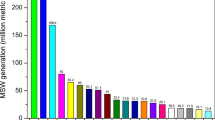Abstract
Municipal solid waste (MSW) source-separated collection was started in Hangzhou since 2010. Life cycle assessment (LCA) is conducted to evaluate its effect on the environment. Four MSW management (MSWM) systems are compared, and the functional unit is defined as the annual MSW generation in the city. Scenario 1 is the mixed collection system, where 50.77 % of the MSW is landfilled and 49.23 % incinerated. Scenario 2 represents the current system under source-separated collection. In addition, two future MSWM plans in the city are also modeled. A new incineration plant is planned to be built as the short-term plan (scenario 3); while food waste biological treatment techniques will be introduced according to the city’s long-term plan (scenario 4). Results show that a total 30, 18, 28 and 29 % of global warming, acidification, nutrient enrichment and photochemical ozone formation has been saved after source separation, respectively. Meanwhile, both the short- and long-term MSWM plans provide positive effect to environmental improvements. Sensitivity analysis further reveals that food waste biological technique is essential with the continuous rise of source separation efficiency; and MSW destined for landfill should be controlled efficiently.










Similar content being viewed by others
References
Chen X, Geng Y, Fujita T (2010) An overview of municipal solid waste management in China. Waste Manage 30:716–724
Zhou C, Hu D, Wang R, Liu J (2011) Exergetic assessment of municipal solid waste management system in south Beijing. Ecol Complex 8:171–176
Calabrò PS (2009) Greenhouse gases emission from municipal waste management: the role of separate collection. Waste Manage 29:2178–2187
Bernstad A, la Cour Jansen J (2012) Separate collection of household food waste for anaerobic degradation-Comparison of different techniques from a systems perspective. Waste Manage 32:806–815
Rigamonti L, Grosso M, Giugliano M (2009) Life cycle assessment for optimising the level of separated collection in integrated MSW management systems. Waste Manage 29:934–944
Banar M, Cokaygil Z, Ozkan A (2009) Life cycle assessment of solid waste management options for Eskisehir, Turkey. Waste Manage 29:54–62
Zhao W, van der Voet E, Zhang Y, Huppes G (2009) Life cycle assessment of municipal solid waste management with regard to greenhouse gas emissions: case study of Tianjin, China. Sci Total Environ 407:1517–1526
Chen T-C, Lin C-F (2008) Greenhouse gases emissions from waste management practices using life cycle inventory model. J Hazard Mater 155:23–31
Zhao W, Huppes G, van der Voet E (2011) Eco-efficiency for greenhouse gas emissions mitigation of municipal solid waste management: a case study of Tianjin, China. Waste Manage 31:1407–1415
Hangzhou Municipal Solid Waste Disposal Supervision Center (2011) Hangzhou municipal solid waste physical property analysis and disposal method. Municipal Solid Waste Disposal Supervision Center, Hangzhou
Consonni S, Giugliano M, Massarutto A, Ragazzi M, Saccani C (2011) Material and energy recovery in integrated waste management systems: project overview and main results. Waste Manage 31:2057–2065
Zhang DQ, Tan SK, Gersberg RM (2010) Municipal solid waste management in China: status, problems and challenges. J Environ Manage 91:1623–1633
Hangzhou Municipal Solid Waste Disposal Supervision Center (2011) Assess for the achievement of the municipal solid waste source-separated collection. Municipal Solid Waste Disposal Supervision Center, Hangzhou
ISO (1997) ISO 14040: Environmental management-life cycle assessment-principles and framework. ISP copyright office, Geneva
Hangzhou First Landfill Site (2003) Second landfill site environmental impact reports. Hangzhou First Landfill Site, Hangzhou
IPCC (Intergovernmental Panel on Climate Change) (2006) 2006 IPCC guidelines for national greenhouse gas inventories. IPCC/IGES, Kanagawa
El-Fadel M, Massoud M (2001) Methane emissions from wastewater management. Environ Pollut 114:177–185
Rigamonti L, Grosso M, Giugliano M (2010) Life cycle assessment of sub-units composing a MSW management system. J Clean Prod 18:1652–1662
Astrup T, Fruergaard T, Christensen TH (2009) Recycling of plastic: accounting of greenhouse gases and global warming contributions. Waste Manage Res 27:763–772
Damgaard A, Larsen AW, Christensen TH (2009) Recycling of metals: accounting of greenhouse gases and global warming contributions. Waste Manage Res 27:773–780
Boldrin A, Neidel TL, Damgaard A, Bhander GS, Møller J, Christensen TH (2011) Modelling of environmental impacts from biological treatment of organic municipal waste in EASEWASTE. Waste Manage 31:619–630
Finnveden G, Johansson J, Lind P, Moberg Å (2005) Life cycle assessment of energy from solid waste-part 1: general methodology and results. J Clean Prod 13:213–229
Wenzel H, Hauschild MZ, Alting L (1997) Environmental Assessment of Products, Volume 1: Methodology, tools and case studies in product development. Chapman and Hall, London
Du R, Qi B, Guo H, Shao B (2011) Characteristics of atmospheric inversion temperature and its influence on concentration of air pollutants in Hangzhou, Zhejiang Province. J Meteorol Environ 27:49–53
Yang J, Nielsen PH (2001) Chinese life cycle impact assessment factors. J Environ Sci 13:205–209
General Administration of Quality Supervision Inspection and Quarantine of China. GB/T 213-2003 Determination of calorific value of coal. 2003
Bernstad A, la Cour Jansen J (2011) A life cycle approach to the management of household food waste–a Swedish full-scale case study. Waste Manage 31:1879–1896
Lee S-H, Choi K-I, Osako M, Dong J-I (2007) Evaluation of environmental burdens caused by changes of food waste management systems in Seoul, Korea. Sci Total Environ 387:42–53
Manfredi S, Christensen TH (2009) Environmental assessment of solid waste landfilling technologies by means of LCA-modeling. Waste Manage 29:32–43
Acknowledgments
This project is supported by the National Basic Research Program of China (No. 2011CB201506), and the National Natural Science Foundation of China (No. 51276168).
Author information
Authors and Affiliations
Corresponding author
Electronic supplementary material
Below is the link to the electronic supplementary material.
Rights and permissions
About this article
Cite this article
Chi, Y., Dong, J., Tang, Y. et al. Life cycle assessment of municipal solid waste source-separated collection and integrated waste management systems in Hangzhou, China. J Mater Cycles Waste Manag 17, 695–706 (2015). https://doi.org/10.1007/s10163-014-0300-8
Received:
Accepted:
Published:
Issue Date:
DOI: https://doi.org/10.1007/s10163-014-0300-8




